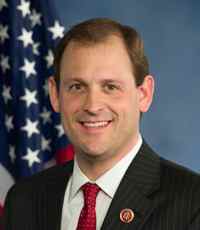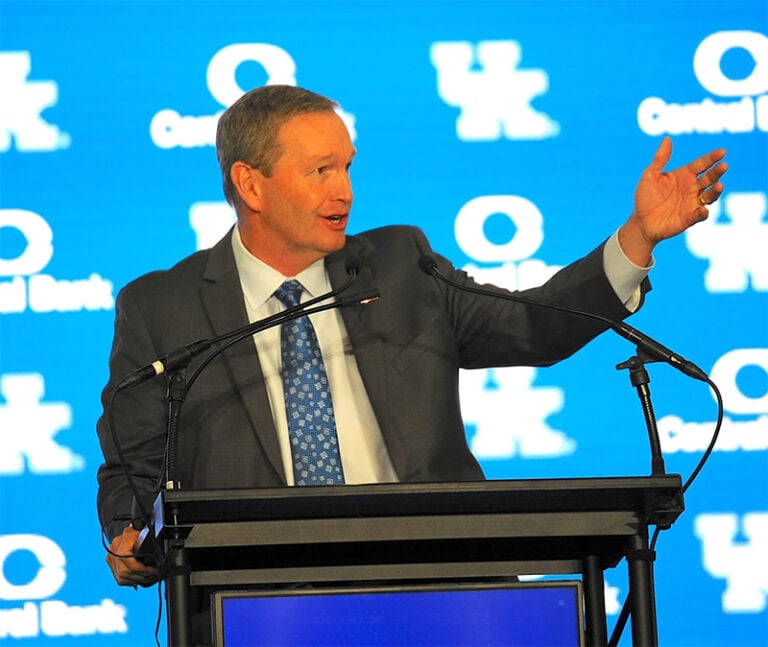WASHINGTON – Rep. Andy Barr apparently has found his calling. Father Damien served the lepers in Hawaii, Clara Barton tended to the wounded during the Civil War, and now Andy is associating himself with yet another poor, beleaguered, downtrodden and star-crossed group – the nation’s bankers.
From his perch on the House Financial Services Committee, the Kentucky Republican is toiling feverishly to free banks and other financial institutions from the onerous requirements imposed to assure that customer deposits are properly protected and the U.S. doesn’t again fall into the sort of economic abyss that visited in 2008 – a humdinger of a recession the nation continues to smart from.

For his undying efforts to save bankers from the flop-sweats derived from filling out forms and making sure they conduct business in a safe and proper fashion, Andy has certainly earned the sobriquet the Mother Teresa of the Money Changers.
You may be surprised to learn that banks are a special class in need of our sympathy and Barr’s protection since, as that infamous yegg Willie Sutton is supposed to have said, that’s where the money is. But the poor, put-upon financiers who nearly ruined the nation’s economy not too long ago obviously merit a break in Barr world.
Barr has offered up several pieces of legislation aimed at the measures imposed by the Dodd-Frank Wall Street Reform and Consumer Protection Act, signed by President Obama in 2010 to, in the words of the legislation, “promote the financial stability of the United States by improving accountability and transparency in the financial system, to end ‘too big to fail,’ to protect the American taxpayer by ending bailouts (and) to protect consumers from abusive financial services practices.’’
Since the law deals with America’s finances, it is about as long and complicated as a piece of legislation can get. Suffice to say it implemented changes regarding the oversight and supervision of financial institutions and created a new agency – the Consumer Financial Protection Bureau – to enforce compliance with consumer financial laws.
And Barr hates it.
“New federal financial regulations are making it harder for Kentuckians to borrow money to buy a home, purchase a car or get a line of credit to start or expand a small business,” Barr said last month. “The result has been devastating especially for rural communities.”
Those regs have also kept things on the up-and-up. But proceed.
Barr is particularly contemptuous of the Consumer Financial Protection Bureau, attacking its independence at every opportunity. The bureau maintains jurisdiction over banks, thrifts and credit unions with assets over $10 billion. These institutions total fewer than 150 but on a combined basis account for $12.5 trillion in assets or nearly 80 percent of the nation’s banking market. The bureau also has supervisory authority over nonbank mortgage originators and servicers, payday lenders (a particular Barr favorite) and private student lenders of all sizes.
Barr’s bill, the ridiculously titled Taking Account of Bureaucrats’ Spending (TABS) Act (when did lawmakers start attaching silly names to their proposals?) does nothing less than place a bull’s-eye on the agency’s heart.
Currently, the CFPB is funded directly by the Federal Reserve. His bill would make it part of the regular congressional budgetary process, setting the stage for a decrease in funding that would render it impotent.
“The TABS Act is essential to assert Congress’s constitutional authority to use the power of the purse over the bureau’s reckless regulatory overreaches, which are hurting communities across the country,” Barr said. “Federal agencies should be subject to congressional oversight and this unaccountable bureau is no different.”
Barr is not acting the maverick here. The similarly disposed House included a provision in its proposed 2016 budget accomplishing the same goal.
The measure looks to erode the bureau’s independence and undoubtedly make it bow at the feet on America’s major financial institutions.
Barr is not acting the maverick here. The similarly disposed House included a provision in its proposed 2016 budget accomplishing the same goal. Obama, in his January State of the Union address, promised to veto such nonsense. Sen. Elizabeth Warren, D-Massachusetts, who helped create the agency before she assumed her seat in the upper chamber – and was denied the directorship of same by her inferiors – is not amused.
“The consumer agency has put in place strong rules to protect consumers from tricks and traps in financial products,” Warren said. “The big banks don’t like that and that’s the No. 1 reason the CFPB should remain free of political influence.”
The U.S. has experienced any number of financial jitters over the past quarter century that should have been aborted before gestation but there was no watchman in the night. Folks in Northern Kentucky will certainly remember the savings and loan crisis that debilitated Cincinnati in the late 1980s. The mortgage crisis, caused by the proliferation of high-risk products and deteriorating underwriting practices during the early years of the 21st century led to one of the worst economic periods since the Great Depression.
Congress passed Dodd-Frank and created the Consumer Financial Protection Bureau in the wake of the mortgage devastation. Steve Antonakes, the CFPB’s deputy director, noted that before those measures were adopted, authority for administering and enforcing the various federal consumer financial laws was strewn across seven federal agencies. For each of those seven agencies, consumer protection was only one of its many responsibilities. As a result, no single agency was primarily focused on protecting the everyday users of financial products and services.
“Our mission is to protect consumers by promoting a consumer financial services marketplace where consumers can understand the costs, benefits and risks of the financial decisions that they make,’’ Antonakes said. “Consumers should be able to make these decisions in a marketplace free from unfair, deceptive, or abusive acts or practices – whether they are applying for a mortgage, choosing a credit card, repaying a student loan, cashing a paycheck, or sending money to family members overseas.’’
That’s the agency Barr wants to rein in and financial institutions have taken notice, assuring that the lawmaker enjoys a soft cushion on the back bench. The firms that Barr helps oversee as a member of the House Subcommittee on Financial Services contributed more than $700,000 to his successful re-election campaign in 2014, about a quarter of the $2.7 million he raised. His Democratic opponent, Elisabeth Jensen, raised $890,000, total.
Barr is well paid for attempting to undermine the nation’s oversight of the financial services sector. Remember that during the next panic.
Washington correspondent Bill Straub served 11 years as the Frankfort Bureau chief for The Kentucky Post. He also is the former White House/political correspondent for Scripps Howard News Service. He currently resides in Silver Spring, Maryland, and writes frequently about the federal government and politics. Email him at williamgstraub@gmail.com.


















